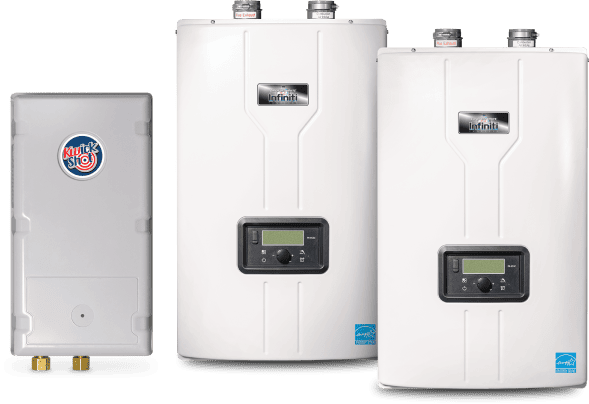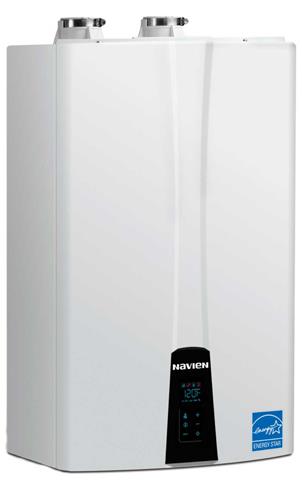Beginning With Energy Savings To Space Efficiency: The Benefits Of Tankless Water Heaters
Beginning With Energy Savings To Space Efficiency: The Benefits Of Tankless Water Heaters
Blog Article
Just how do you really feel about Six Benefits of a Tankless Hot Water Heater?

In a world where convenience and effectiveness reign supreme, it's not a surprise that home owners are continuously in search of smarter ways to manage their home's power intake and comfort. One technology that has continuously gotten popularity is the tankless hot water heater. However just what makes these systems stand apart from the traditional tank-based versions the majority of us matured with? Allow's dive in and explore the advantages of tankless hot water heater, aiding you choose if it's time to make the button in your home.
Intro
Image this: you step into the shower after a long day, anticipating a soothing cascade of hot water, just to be welcomed by icy beads due to the fact that the last person utilized everything up. Audio acquainted? Typical hot water heater save a set amount of warm water, suggesting you're at the grace of that storage tank's supply. Tankless systems, on the other hand, heat water as needed. No more going out mid-shower, say goodbye to wrestling with schedules simply to make certain hot water is readily available.
Comprehending Tankless Hot Water Heater
What Are Tankless Water Heaters?
Tankless hot water heater, sometimes referred to as on-demand or instantaneous hot water heater, offer hot water just as it's needed. Rather than keeping gallons of pre-heated water, these devices kick right into activity the minute you turn on the tap. Water travels through a warmth exchanger, warming up in real-time, suggesting you obtain an uninterrupted flow of hot water without the requirement for a big storage tank sitting idly by.
How Do They Vary from Traditional Solutions?
Typical heaters hold a storage tank of hot water, making use of energy to maintain that storage tank at a constant temperature. Tankless units eliminate the standing supply, reducing thrown away power and the cumbersome impact of a huge cylinder. Essentially, you're upgrading from a "accumulation" way of thinking to a "made-to-order" method.
Usual Types of Tankless Units
Tankless hot water heater normally are available in 2 varieties: gas and electric. Gas designs often tend to provide greater circulation prices, perfect for bigger households, while electric models usually offer smaller homes and are typically easier to set up. In addition, some systems are developed for point-of-use (offering one component) while others can manage the whole home's hot water requirements.
Trick Benefits of Tankless Water Heaters
Energy Efficiency and Expense Savings
Say goodbye to heating a titan tank's worth of water and maintaining it cozy all the time. Tankless heaters decrease standby power losses, which can decrease energy bills. While the preliminary cost may be greater, the long-term cost savings frequently validate the investment.
3. Space-Saving Layout
If your home is short on storage space, getting rid of the bulky tank frees up important area. Tankless systems are portable and can often be placed on wall surfaces, stashed in corners, or installed in limited utility closets without grabbing all of the whole room.
4. Longer Life-span
A well-kept tankless water heater can outlast its tank-based relative. Standard tanks could last 10-15 years, while tankless designs can keep downing along for two decades or even more, making them a solid financial investment gradually.
1. Limitless Hot Water Supply
Ever before had to arrange showers so everybody gets their reasonable share of hot water? With tankless, that becomes a thing of the past. As long as the heating system's circulation ability isn't gone beyond, you can take back-to-back showers without developing into a popsicle.
5. Improved Water Top Quality
Saving water in a container can occasionally cause sediment buildup or a somewhat "off" preference. With tankless systems, fresh water is heated up instantly, decreasing the chances of debris build-up and potentially supplying cleaner-tasting water.
Considerations Before Changing
Though the benefits are compelling, it's a good idea to think about a few factors before totally devoting.
Evaluating Your Home's Water Use Patterns
If your house all at once uses multiple fixtures with high warm water need, see to it the unit's circulation price meets your demands. Understanding your usage patterns assists you pick the appropriate size and sort of tankless heating unit.
Upkeep and Care Tips
Tankless systems are reasonably low upkeep, yet they aren't set-it-and-forget-it devices.
Normal Cleansing and Descaling
Tough water minerals can develop in the warm exchanger, affecting effectiveness. Routine descaling (commonly advised every year) maintains the device going for peak performance.
Yearly Expert Examinations
A yearly checkup from a professional makes sure small concerns are caught early. They'll analyze the unit's efficiency, look for leaks, and aid preserve optimum efficiency.
Initial Investment Prices
Tankless heaters generally come with a greater in advance price tag. In between the system itself and potential installment adjustments, the initial expense might give you sticker label shock. But bear in mind to see it as a lasting investment.
Installment Needs
Depending on your home's facilities, you may require added electric capacity or gas line upgrades. Ensure you understand the setup needs and consult with a professional to prevent surprises.
Ensuring Correct Air Flow
For gas versions, proper ventilation is necessary to securely remove exhaust gases. Ensure venting systems are tidy and properly mounted to prevent any possible safety threats.
Contrasting Different Brands and Versions
Not all tankless water heaters are developed equivalent.
Researching Dependable Producers
Look for trustworthy brand names with a background of generating top quality devices. A trusted supplier commonly gives far better client support and longer warranties.
Installation: Do It Yourself or Expert?
While some home owners enjoy taking on projects themselves, tankless setup could not be the best time to break out the tool kit.
Pros and Cons of DIY Setup
A do it yourself install could save money, however it features threats. Incorrect installation can result in ineffectiveness or security problems. If you come in handy and have experience, it might be possible-- but proceed with caution.
Reading Testimonials and Customer Comments
Individual reviews and feedback from next-door neighbors or close friends who have gone tankless can use useful understandings. Occasionally, real-life experiences can be much more informing than advertising and marketing brochures.
When to Call a Professional Plumber
For a lot of, calling a pro ensures whatever's done appropriately. An expert plumber comprehends neighborhood codes, sizing requirements, and airing vent criteria, decreasing the threat of mishaps.
Taking full advantage of Performance
You have actually bought a tankless device-- currently optimize its efficiency.
Optimal Temperature Setups
Many people set their devices between 120-140 F. Changing the temperature can enhance comfort and savings. Experiment to find a sweet spot that does not lose energy.
Pairing with Low-Flow Fixtures
Want to extend your device's abilities? Think about installing low-flow showerheads and taps. They decrease water use, enabling your tankless system to deliver a steady stream of warm water without straining.
Ecological Impact
Tankless hot water heater align with greener living goals.
Minimized Carbon Footprint
By utilizing much less power and just heating water as required, tankless systems can lower your home's carbon impact, lowering your environmental influence.
Preserving Natural Resources
Much less power intake and much less squandered warm water translate into fewer natural deposits being made use of, an environmental win-win.
Who Profits The Majority Of from Tankless Heaters?
The beauty of tankless heating units is that they can fit a range of families.
Huge Family Members vs. Solitary Occupants
Big family members could enjoy the countless warm water supply, while single residents appreciate the energy savings from not warming a whole storage tank for just a single person's morning shower.
Property Owners with Limited Room
If your home is short on square footage, losing the large container liberates room for various other fundamentals-- or possibly just more elbow room.
Eco-Conscious Customers
Going tankless aligns with eco-friendly values, guaranteeing you're not squandering energy or sources.
Future Trends in Tankless Hot Water Heater
The world of home devices is ever-evolving, and tankless hot water heater are no exception.
Innovations in Innovation
R&D is constantly enhancing warmth exchangers, making units much more effective and sturdy. Future versions might be even quieter, a lot more portable, and far better matched for differing environments.
Smart Home Assimilation
Imagine adjusting your water heater's temperature via an app or receiving upkeep signals on your phone. As clever home technology developments, we'll see more connection and ease.
Final thought
Picking a tankless water heater is greater than just updating your home's warm water system; it's purchasing long-term comfort, power efficiency, and a greener way of living. By considering your household's water use, bearing in mind installment needs, and dedicating to regular upkeep, you can enjoy a steady stream of warm water without the baggage of a cumbersome tank. As modern technology develops, you can look forward to also smarter, more effective tankless remedies that not just make your life simpler yet also profit the earth.
Pros and Cons of Tankless Water Heaters
Tankless Water Heater Pros
Saves Energy: Simply put, you re spending less energy to create hot water, so your total carbon footprint goes down, not to mention your bills. Lasts Longer Than Storage Tanks: Storage tank units need to be replaced every 15 years or so. But tankless units? They can last for 30 years before they give out on you. Constant Hot Water: Need to take a shower and don t want the water running cold? Awesome it won t. The water will stay hot the entire time because it creates hot water on demand. Saves You Money: Less water usage equals less money. Beyond that, you re not paying to keep water hot 24/7. Those savings add up quickly. Better for the Environment: Less water waste is better for everyone. It saves you money, but it s also environmentally conscious at the same time. Tankless Water Heater Cons
It Can Take a Minute: Depending on your specific unit and its placement, it can take anywhere from 10 seconds to 2 minutes to fully heat up. Because there s no storage tank, it heats water as you need it. Upfront Purchase Price: While we talked about their longevity, there s sticker shock when you look at brand-new tankless units to install. It pays for itself, but it s still a big chunk of change at first. Has its Limits: If you run multiple appliances at once, such as the dishwasher, washing machine, and maybe you take a shower at the same time, there might not be enough hot water. https://www.airsouthnow.com/blog/water-heater-service/pros-and-cons-of-tankless-water-heaters/

I have been very involved in Six Benefits of a Tankless Hot Water Heater and I am hoping you appreciated the new page. Do you know somebody else who is occupied with Pros and Cons of Tankless Water Heater? Be sure share it. Thanks so much for your time spent reading it.
Click Here Report this page